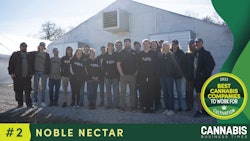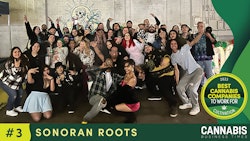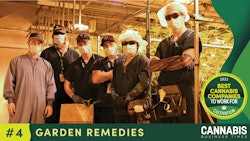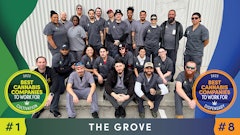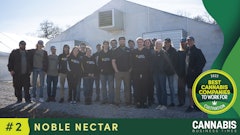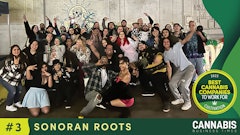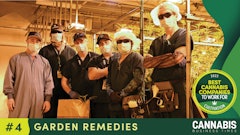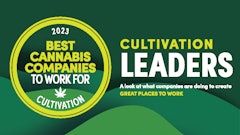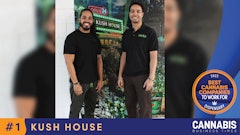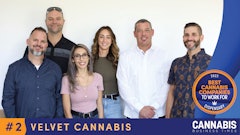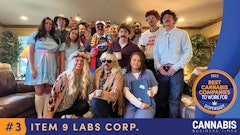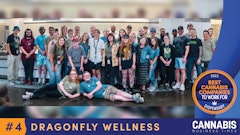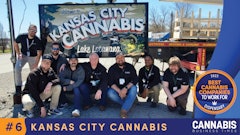
Veritas Fine Cannabis has been around for as long as legal adult-use cannabis sales have proliferated in the U.S. Along the way, the team has learned a thing or two about how to build a sustainable business that keeps employees engaged and happy. A positive workplace translates to good customer relations—and that matters a lot in this rapidly evolving marketplace.
Company president Jon Spadafora, who assumed the mantle in March 2022 after serving as head of marketing for seven years, understands the importance of valuing those employees. Not for nothing, this is the second time that Veritas Fine Cannabis has landed on CBT’s list of the Best Cannabis Companies To Work For.
Here, we’re pleased to share insightful excerpts from a recent interview with Spadafora.
Editor's Note: Presented by Cannabis Business Times in an as-told-to format. Spadafora shared below information directly with CBT. Edited for length and clarity
We've got a large enough team that they can focus on the part of the process that they own. We've been able to attract a tremendous group of people who are all very connected to the plant. … The people who are here are here because they want to be here, and they're here because they really care about what we're putting out, and they want to put out something that reflects the product that they're looking for. That's been just a truly amazing part of the experience for all of us: to work next to people who all care as much as we do.
The biggest quality that we ask for is that you check your ego at the door.
My partner, Mike, started something about two years ago where every month we would sit down with a different group of the team—say, a group of 20, and that could be a couple of departments, or it could be everyone whose last name ends in a vowel or whatever. We'd get together and we'd sit around in a circle and say, “Okay, this is what we're doing as a company. This is where we're headed. What do you think about that? What can we do better? What ideas do you have?”
I moved to Denver in 2014. My youngest daughter has a pretty unique medical condition, and we had gone through quite a few treatments that were available, and none of them had really offered the relief that we were looking for. It was right about the time that CNN did the story about Charlotte's Webb with Sanjay Gupta. We lived in Las Vegas, and we used to travel to UCLA. We'd go to LA for appointments just because that was the closest care. And the neurologist told us, “Well, I don't really know what to do next.” They gave us a list of options that were all experimental in nature. So, in 2014, we moved as a family to Colorado to start treatment for my daughter. In doing that, she found relief.
I just happened to bump into an old college buddy who had invested in what is now Veritas at the very, very beginning. I was working in hospitality, and I was kind of back into using cannabis as a consumer pretty frequently and going into stores. I was really surprised that it was very difficult as a consumer to track quality from store to store and across the experience, because back in those days it was just jars of weed and it was all only marked by the strain, not really marked by who grew it. That discussion went into a process where [Veritas] asked me to come in, and I worked with them to help create the brand initially.
We’ll do an event at Red Rocks, and the event will be staffed by the people who actually trim or the people who actually grow. It makes the brand stay connected to the heartbeat of the company.
I've been really fortunate that I worked for some amazing leaders. I was really young and I was really green. I was 23 when I entered the workforce right out of college. I was really lucky to work on a project: It was the development of the first new casino in Atlantic City in years. It was the Borgata. It's a beautiful project. I had the good fortune of working for people who expected excellence, and they expected that of themselves. And they got it in a way that they shared the process and they allowed you to make mistakes. They walked you through what you learned in there. It created an environment where you wanted to make sure your work was great because you didn't want to be the one that was making the mistake. I really learned about the thrill of encouraging wins for the people who worked around me. From my standpoint, a leader should be involved in the process. They should be willing to get dirty, they should be willing to participate, but, most importantly, be willing to try to bring everyone around them up.
The most important thing from a cultural standpoint is that everybody understands we're all part of the same mission. We’re all trying to do the same job. We have different parts of that job, but we try to interact frequently.
I just walked through the garden this afternoon, and we were looking at the next round of new things we're putting out. We had a strain that was actually bred by a friend of ours, by Higher Grade, which is a store in Colorado. A gentleman who runs their garden used to work with us a long time ago, and he's a phenomenal breeder. He bred a strain called Sour Orange Zkittlez, and it’s the strain that we won the High Times Cannabis Cup with this year. The nose on this strain is incredibly, incredibly fruity. It's a very tasty smoke. It actually tastes like it smells, and it's a pretty engaging sativa.
I like to ski, right? And if you're out skiing somewhere, sometimes the guide will be like, “This is a ‘No Fall Zone,’” meaning, “Pay attention. Don't mess up. We need to be careful.” I think that cannabis is in a “No Fall Zone” right now—and I think that we're in a spot where the opportunity's fantastic, but it's a tough world out there.
It's not about how much more you can grow anymore. We sat down as a leadership group and said, “Well, how are we going to get through this together?” We really worked to develop a plan as a group and said, “What are we good at? Where are the opportunities? What can we do better here? How can we reduce our expenses so we can maintain the quality that we're accustomed to, but also be prepared in a market where pricing is going to fall?” We came back and said we're going to focus on two things. We're going to focus on people and we're going to focus on products. We’re going to make decisions collectively as a group that benefit those two things.
I'm one of those people, I get really obsessive with specific artists. Right now, I'm listening to a lot of Stick Figure. I’m a huge Stick Figure fan.
There was a guy at Borgata, and he had a saying that at first used to drive me crazy because I never understood it. And it makes a lot more sense now. He used to say, “Trust but verify.” You would pitch what you wanted to do and you'd lay out your plan, and he'd give you the resources, but then you had to be prepared for that date when he was going to come and check up on how it was going.
I joke around when I hire people and say that I'm inherently lazy. I want to go through and not create any additional chaos. The fact is that this is an emerging industry and there's enough chaos. Let's work together to create the best processes and the right opportunities for the right people to influence the business.











